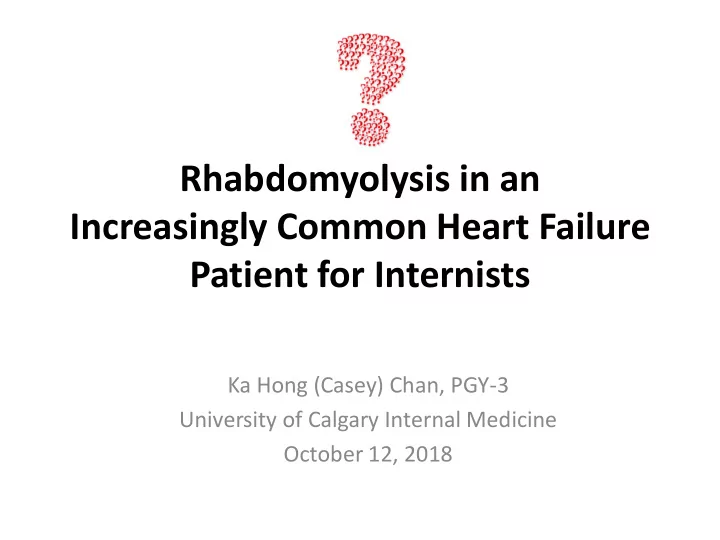

Rhabdomyolysis in an Increasingly Common Heart Failure Patient for Internists Ka Hong (Casey) Chan, PGY-3 University of Calgary Internal Medicine October 12, 2018
Disclosures There are no conflicts or disclosures • The patient had provided consent to this case • report
Meet Mr. Jones… 83M who presented with myalgias Past Medical History: 1. Recent diagnosis of non ischemic dilated cardiomyopathy with EF of 18%, NYHA II baseline 2. Dyslipidemia 3. Hypertension 4. Type 2 Diabetes Mellitus 5. Chronic Thrombocytopenia Medications: 1. ASA 4. Spironolactone 2. Metoprolol 5. Atorvastatin 3. Irbesartan 6. Metformin/Gliclazide
Meet Mr. Jones… 1. Irbesartan switched to sacubitril/valsartan 2. Progressive myalgias from walking to cane to almost bed bound due to lethargy and weakness 3. Presented to hospital due to fall Calendar from https://www.pinterest.ca/pin/613263674234187255/
Physical Exam: Afebrile but tachycardic • CNS: Normal CN. 4/5 strength in quadriceps/knees, • otherwise normal including reflexes CVS: Elevated JVP, normal HS • No rash, compartment syndrome or foci of • infection
Investigations: 127 162 (baseline ~120) 99 135 4.3 5.8 21 98 10.7 CK: 16500 TSH: Normal Bili: 42 Top HS: 300 382 Troponin I: -ve Urinanalysis: Hematuria on dipstick, negative RBC on microscopy. Granular casts
Why did this gentleman with CHF get Rhabdomyolysis?
Increasingly Common CHF Patient: Sacubitril/Valsartan has been approved by FDA • and Health Canada since 2015 2017 CCS Guidelines recommend its use its use in • patients who remain symptomatic despite appropriate goal-directed medical therapy McMurray et al. (2014) PARADIGM-HF. NEJM
Adverse Effects: No mention of rhabdomylosis as a side effect in • PARADIGM-HF 60% of patients had ischemic cardiomyopathy and • presumably, would have been on a statin McMurray et al. (2014) PARADIGM-HF. NEJM
Mechanism of Adverse Effect: Hepatocyte Blood Bile OATP1B1 Atorvastatin Atorvastatin OATP1B3 CYP3A4 P-glycoprotein Metabolites Sacubitril/valsartan BRCP Cyclosporine Rifampin
Why Atorvastatin? Lin et al. (2017) Journal of Pharmaceutical Sciences 106 (2017) 1439-1451
Clinical Implications: Other statins metabolized through OATP, but • pharmacokinetics do not align with maximum concentration for possible adverse effects ? Alter the dosing timing, or consider other statins • Importance for understanding this risk when co- • prescribing this medication and counselling patients accordingly Image from Videoblocks.com
Back to Mr. Jones
Objectives: 1. Recognize the increasing importance of evaluating for drug interactions in complex patients with new presentations 2. Identify rhabdomyolysis as a potential drug interaction when prescribing sacubitril/valsartan with statins, and the role that information technology played to find the mechanism 3. Apply the underlying pharmacokinetic mechanism to provide alternatives when co-administration is required
Summary: Questions? Picture accessed on Laura Tilson Osteopathy
References: 1. Lin W, Ji T, Einolf H, Ayalasomayajula S, Lin TH, Hanna I, et al. Evaluation of Drug-Drug Interaction Potential Between Sacubitril/Valsartan (LCZ696) and Statins Using a Physiologically Based Pharmacokinetic Model. Journal of pharmaceutical sciences. 2017;106(5):1439-51. 2. Yancy CW, Jessup M, Bozkurt B, Butler J, Casey DE, Jr., Colvin MM, et al. 2017 ACC/AHA/HFSA Focused Update of the 2013 ACCF/AHA Guideline for the Management of Heart Failure: A Report of the American College of Cardiology/American Heart Association Task Force on Clinical Practice Guidelines and the Heart Failure Society of America. Circulation. 2017;136(6):e137-e61. 3. Ezekowitz JA, O'Meara E, McDonald MA, Abrams H, Chan M, Ducharme A, et al. 2017 Comprehensive Update of the Canadian Cardiovascular Society Guidelines for the Management of Heart Failure. The Canadian journal of cardiology. 2017;33(11):1342-433. 4. McMurray JJ, Packer M, Desai AS, Gong J, Lefkowitz MP, Rizkala AR, et al. Angiotensin-neprilysin inhibition versus enalapril in heart failure. The New England journal of medicine. 2014;371(11):993- 1004. 5. Ayalasomayajula S, Han Y, Langenickel T, Malcolm K, Zhou W, Hanna I, et al. In vitro and clinical evaluation of OATP-mediated drug interaction potential of sacubitril/valsartan (LCZ696). Journal of clinical pharmacy and therapeutics. 2016;41(4):424-31. 6. Kalliokoski A, Niemi M. Impact of OATP transporters on pharmacokinetics. British journal of pharmacology. 2009;158(3):693-705.
Recommend
More recommend